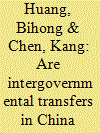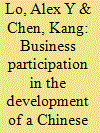| Srl | Item |
| 1 |
ID:
128151


|
|
|
|
|
| Publication |
2012.
|
| Summary/Abstract |
Since 1994, China's central government has implemented a sequence of fiscal recentralization measures to increase its equalization capacity and reduce regional income disparities. However, the effect of intergovernmental transfers on equalization has been called into question by anecdotal evidence that seems to suggest that transfers from the center are not rule-based and are subject to heavy rent-seeking. Unlike past studies, which have focused on the equalization effects of total fiscal transfers from the center, this paper includes an examination of the equalization effects of different types of transfers because some transfers, which are inherently anti-equalizing, may mask the equalization effects of other types of transfers when they are lumped together to find the "average" effect. Using inequality measures, a decomposition of fiscal disparities, and dynamic panel data models, we find that China's intergovernmental transfer system that was established in 1994 does have some equalizing elements. To a large extent, these elements exist due to the mechanism designed to shrink the tax rebates that bear the legacy of the pre-1994 system; to a small extent, these elements exist due to the rule-based general-purpose transfer whose share in total transfers remains small but has increased since 2002. However, the equalization effects of the largest component of transfers, specific-purpose transfers, are anti-equalizing. They are typically not rule-based and thus subject to political influence. As a result, total transfers also exhibit significant anti-equalization effects.
|
|
|
|
|
|
|
|
|
|
|
|
|
|
|
|
| 2 |
ID:
176751


|
|
|
|
|
| Summary/Abstract |
Businesses are often involved in climate change governance and form networks to influence policy. They are evidently important for the implementation of market-based emission trading schemes and their general role has been widely discussed. However, there is a variety of business networks, and their specific structures and organizing styles are poorly understood, particularly in the non-Western context. This study identifies the ways in which one of these networks was organized and performed a governing function in the development of an emission trading scheme in China. We found that the policy development was neither highly top-down nor bottom-up, and business participation was hierarchical. Key governing roles were effectively performed by a small group of collaborating business organizations, which were essentially public-private hybrid actors and able to build linkages between the top and the bottom levels. The findings indicate the decisive qualitative differences in business leadership in the development of market-based policy.
|
|
|
|
|
|
|
|
|
|
|
|
|
|
|
|
| 3 |
ID:
175622


|
|
|
|
|
| Summary/Abstract |
This paper aims to shed light on where China’s reform process is heading by tracing the trajectory of its market-oriented reforms. It shows that Chinese market socialism is facing a dilemma. Developing the capital market and hardening local government budget constraints which are necessary for the structural adjustment of the economy would require China to go beyond the limits of market socialism. Focusing on socialist values and ideology might gain more political traction for the party but could also seriously change the political climate and trigger an unorganized collective action among government officials that unleashes massive bureaucratic interventions and destroys the market’s vitality.
|
|
|
|
|
|
|
|
|
|
|
|
|
|
|
|